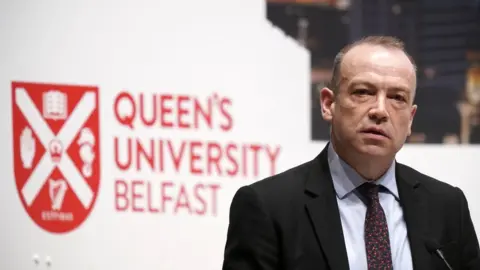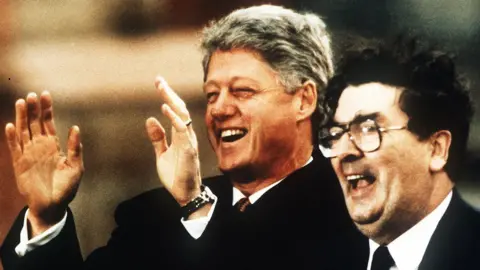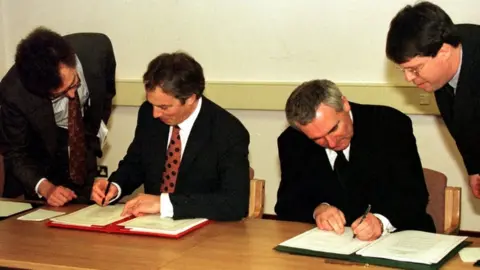Chris Heaton-Harris says Stormont is best way to secure union
 Niall Carson
Niall CarsonPower-sharing is the surest way to secure Northern Ireland's place in the union, the NI secretary has said.
Chris Heaton-Harris was speaking at a conference to mark the 25th anniversary of the Good Friday Agreement.
In what could be seen as a direct challenge to unionist politicians, he also said real leadership was about having the courage to say yes.
Democratic Unionist Party (DUP) leader Sir Jeffrey Donaldson said "berating unionists won't solve the problem".
Northern Ireland is currently without a power-sharing government.
The Northern Ireland secretary said those who are proud of Northern Ireland's place in the United Kingdom "should put the union first" and restore the devolved institutions.
'Cheap round of applause'
Stormont collapsed in February 2022 after the DUP pulled out of the institutions in protest at post-Brexit trading arrangements.
The party has expressed concerns over the newest deal, the Windsor Framework, which the UK agreed with the EU earlier in 2023.
Mr Heaton-Harris said the people of Northern Ireland were demanding better, more responsive public services, greater economic prosperity and a brighter future for their children.
"The biggest threat to Northern Ireland's place in the union is failing to deliver on these priorities," he added.
In a tweet on Tuesday afternoon, Sir Jeffrey said: "The great and the good can lecture us all they want for a cheap round of applause but it won't change the political reality.
"The political institutions only work when there is cross-community consensus."


While most of the speakers this week so far managed their words carefully, this was a direct and intentional dig by Chris Heaton-Harris.
"Real leaders know when to say yes," he said, and anyone watching his speech could guess who that was aimed at.
He pushed further still, saying that the ongoing Stormont stalemate was the "single biggest threat to the union".
It's a warning others may put some stock in but it won't move the dial or nudge the DUP back into government.
The DUP leader Sir Jeffrey Donaldson was not in the audience to hear the warnings.
His party was represented at a panel event by Emma Little-Pengelly.

Tánaiste (Irish deputy prime minister) Micheál Martin, who also spoke at the event, echoed the call for a return to power-sharing.
He said the UK government and the European Commission had "stretched" themselves to reach a deal for Northern Ireland and called on parties to "recapture and renew that generous spirit" of the Good Friday Agreement.
"I urge all elected officials to take their seats in the assembly and the executive and get to work on the questions of everyday life that matter to the people of Northern Ireland," he added.
There are a number of events to mark the anniversary of the Good Friday Agreement, which was designed to bring an end to the Troubles.
It also established power-sharing institutions at Stormont that involved nationalists and unionists governing Northern Ireland together.
The three-day Agreement 25 conference at Queen's University Belfast features people who have made an impact on the international stage.
Bill and Hillary Clinton, former British prime minister Sir Tony Blair and former Taoiseach (Irish Prime Minister) Bertie Ahern are among those taking part.
 Pacemaker Press
Pacemaker PressFormer US President Bill Clinton is to return to Londonderry later to honour two of the main architects of the 1998 peace deal.
He is making a poignant return to the city where he will speak about the late John Hume and David Trimble.
Former US Senator George Mitchell, who chaired the talks that led to the 1998 peace deal, was the keynote speaker at the conference's launch on Monday.
He called on the people of Northern Ireland not to give up on their belief that the future could be better.
The theme for Tuesday's event is Renew and UN Secretary General Antonio Guterres delivered a keynote video address.

What is the Good Friday Agreement?

Also known as the Belfast Agreement, it was a political deal designed to bring an end to 30 years of violent conflict known as the Troubles.
Signed on 10 April 1998 and approved by public votes in Northern Ireland and the Republic of Ireland, it is based on the idea of co-operation between communities.
It helped to set up a new government for Northern Ireland, representing both nationalists and unionists.
Read more: What is the Good Friday Agreement?

A discussion about the Good Friday Agreement as a template for resolving global template will be chaired by former US special envoy Mitchell B Reiss.
Among those taking part are the former President of Ireland Mary Robinson and European Commission Vice-President Maroš Šefčovič.
In the afternoon, senior academics and law specialists will discuss human rights, social justice, peacebuilding and the legacy of the Good Friday Agreement.
A series of other events will include the voices of those directly affected by the Troubles, as well as women, young people and those working in the media.
Prime Minister Rishi Sunak is set to make a closing address to the conference on Wednesday ahead of a dinner event which former prime ministers Boris Johnson and Liz Truss are expected to attend.

Declan Harvey and Tara Mills explore the text of the Good Friday Agreement, scrutinising the deal's wording and hearing from some of the people who helped get it across the line.
Click here to listen on BBC Sounds.

